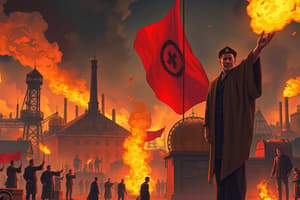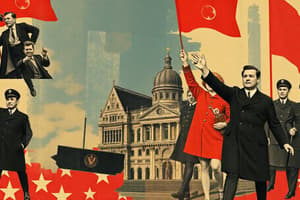Podcast
Questions and Answers
Which of the following was NOT a form of socialist ideology adopted by movements in Europe during the late 19th and early 20th centuries?
Which of the following was NOT a form of socialist ideology adopted by movements in Europe during the late 19th and early 20th centuries?
- Anarchism
- Authoritarianism (correct)
- Revolutionary Marxism
- Social democracy
What was one of the key ideologies that influenced the emergence of socialism in Europe?
What was one of the key ideologies that influenced the emergence of socialism in Europe?
- Free market capitalism
- Monarchy
- Feudalism
- Welfare state (correct)
What major societal group saw significant growth leading to the rise of socialist parties in Europe?
What major societal group saw significant growth leading to the rise of socialist parties in Europe?
- Middle-class professionals
- Intellectuals
- Nobility
- Working class (correct)
Which factor contributed to the attraction of workers, intellectuals, and middle-class professionals to socialist parties in Europe?
Which factor contributed to the attraction of workers, intellectuals, and middle-class professionals to socialist parties in Europe?
In which century did socialist parties become major political forces in many European countries?
In which century did socialist parties become major political forces in many European countries?
What did socialist movements in Europe aim to achieve?
What did socialist movements in Europe aim to achieve?
What was the dominant form of socialism in Europe that sought to achieve socialism through democratic means and parliamentary politics?
What was the dominant form of socialism in Europe that sought to achieve socialism through democratic means and parliamentary politics?
Which country did the Bolshevik Party successfully seize power in during the October 1917 phase of the Russian Revolution?
Which country did the Bolshevik Party successfully seize power in during the October 1917 phase of the Russian Revolution?
Which political party aimed to establish a socialist state and led the second phase of the Russian Revolution?
Which political party aimed to establish a socialist state and led the second phase of the Russian Revolution?
What was a key impact of the Russian Revolution on global politics?
What was a key impact of the Russian Revolution on global politics?
How did many European countries respond in the post-World War II period to the rise of socialism and the Russian Revolution?
How did many European countries respond in the post-World War II period to the rise of socialism and the Russian Revolution?
What was a consequence of the economic and social reforms implemented by the Soviet Union post-Russian Revolution?
What was a consequence of the economic and social reforms implemented by the Soviet Union post-Russian Revolution?
Study Notes
Socialism in Europe and Russian Revolution
Throughout the late 19th and early 20th centuries, Europe underwent a period of profound social, political, and economic transformation. One of the most significant movements during this time was the rise of socialism, a political, economic, and social ideology aimed at creating a more equal and just society. The Russian Revolution, which began in 1917, played a pivotal role in shaping the global landscape of socialism, and in this article, we'll explore the interplay between socialism in Europe and the Russian Revolution.
Socialism in Europe
Socialism emerged as an alternative to the traditional liberal capitalist model. It was influenced by ideas such as the welfare state, collective ownership of major industries, and increased economic equality. Socialist movements in Europe were diverse, taking many forms and adopting a range of ideologies, including social democracy, revolutionary Marxism, and anarchism.
Socialist parties across Europe experienced significant growth in the late 19th century, with the rise of the working class, the growth of trade unions, and the emergence of left-wing intellectual movements. By the early 20th century, socialist parties had become major political forces in many European countries, attracting support from a broad range of voters, including workers, intellectuals, and middle-class professionals.
Socialist parties used various tactics to achieve their goals, including parliamentary politics, trade union activism, and, in some cases, revolutionary action. Social democracy, which sought to achieve socialism through democratic means and parliamentary politics, became the dominant form of socialism in Europe. However, revolutionary Marxist and anarchist movements also gained support, particularly in countries such as Russia, Germany, and Italy.
The Russian Revolution
The Russian Revolution was a seminal event that fundamentally altered the course of European and global history. The revolution began as a struggle against the autocratic rule of Tsar Nicholas II and rapidly developed into a broader conflict between the forces of socialism and capitalism.
The first phase of the Russian Revolution, which began in February 1917, was led by the Russian bourgeoisie, who sought to overthrow the Tsar and establish a more liberal, democratic government. However, the provisional government that emerged from this first revolution was unable to deal with the economic and social problems facing the country, and support for more radical socialist factions grew.
The second phase of the Russian Revolution, which began in October 1917, was led by the Bolshevik Party, a revolutionary Marxist party that aimed to establish a socialist state. The Bolsheviks' success in seizing power and establishing the Soviet Union had a profound impact on global politics, inspiring left-wing movements and socialist parties around the world.
The Soviet Union, led by Vladimir Lenin and Joseph Stalin, implemented a number of far-reaching social and economic reforms, including the nationalization of major industries, the collectivization of agriculture, and the creation of a centralized command economy. While these policies achieved a degree of economic equality and social justice, they also led to widespread poverty, famine, and political repression.
The Legacy of Socialism in Europe and the Russian Revolution
The rise of socialism in Europe and the Russian Revolution have left a complex and enduring legacy. While socialist movements and parties have continued to influence European politics, the Soviet Union's experience demonstrated the limitations and challenges of implementing a socialist system on a national scale.
In the post-World War II period, many European countries adopted social democratic policies, building welfare states and expanding public services. These policies helped to reduce poverty and improve social and economic equality, but they also led to increased government spending and higher taxes.
Today, socialism remains a contested and controversial political ideology. Some argue that socialist policies have been largely successful in reducing poverty and improving economic equality, while others maintain that they have led to economic stagnation and political repression. Regardless of one's perspective, it is clear that the rise of socialism in Europe and the Russian Revolution have had a profound impact on global politics, and their legacy continues to shape the political landscape today.
Studying That Suits You
Use AI to generate personalized quizzes and flashcards to suit your learning preferences.
Description
Test your knowledge on the rise of socialism in Europe and the impact of the Russian Revolution on global politics. Explore the key ideologies, movements, and historical events that shaped the social, political, and economic landscape of Europe in the late 19th and early 20th centuries.




